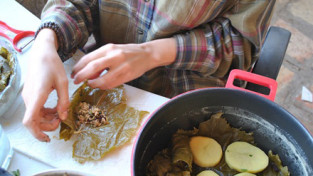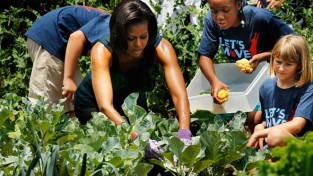The Maven: Minimizing Wasted Food
 How much food do you waste? A day? A week? A month? We all waste food. An estimated 25 percent of the food Americans purchase goes uneaten. That means food—and money—being thrown away, and landfills filling up with unnecessary waste. But minimizing wasted food, money, and resources is something each of us can do by making small changes to daily habits. Those behavior changes will have a collective impact on improving our food system.
How much food do you waste? A day? A week? A month? We all waste food. An estimated 25 percent of the food Americans purchase goes uneaten. That means food—and money—being thrown away, and landfills filling up with unnecessary waste. But minimizing wasted food, money, and resources is something each of us can do by making small changes to daily habits. Those behavior changes will have a collective impact on improving our food system.
Assess Current Waste
Take a close look at the food you are already wasting. For one week, place all of your discarded food into a liquid-tight container. Write down each item, estimated amount discarded, and estimated purchase price. If you’re interested in tracking wasted food over time, you may want to start a spreadsheet and relate it back to your household budget.
Consider Other Costs
How much do you spend a month on trash collection or drop off? An estimated 50 percent of what households throw away could be composted or recycled. Properly separating out those materials may save you money as well. As members of the Mount Holyoke community it’s not just our wallets that motivates us. It’s the impact on the global community and our environment. Food decomposing in a landfill produces methane, a greenhouse gas (GHG) that is twenty times more heat trapping than carbon dioxide. The United States Environmental Protection Agency states that landfills are among the top three sources of anthropogenic methane produced in the nation. When we prevent wasted food and divert food scraps from the landfill we save more than our pennies; we are mitigating GHG production and improving the food system.
Take Back Control
Make a commitment to make change—and encourage others to do the same. Make a grocery list that reflects meal planning—including leftovers—for the week. Store food in transparent containers and note the date it was prepared to serve as a reminder to eat it soon. Be inventive with your recipes to use unneeded components from one meal in the creation of another. Remember that freezing is a good option, too. Set up a compost system for the unavoidable food scraps, like vegetable peels and rinds. Small changes yield measurable results. You’ll succeed in wasting less and spending less, and you’ll feel more in control of your own impact on the environment.
—By Bryn Oakleaf ’05
 Bryn Oakleaf ’05 is a waste prevention and diversion environmental analyst with the Vermont Department of Environmental Conservation and vice president of the board for the Northeast Recycling Council. Since serving as a speaker at the first Zero Food Waste Forum in 2014, Oakleaf has been driven not only to divert unwanted food from landfills but to capture and redirect edible food. The interconnected aspects of climate change, food access, and wasted resource prevention are issues that she works daily to overcome. Oakleaf has fostered relationships with community partners that specialize in capturing surplus edible food and redistributing it to those in need (i.e., food rescue). In just under a year there has been a near 100 percent increase in food rescued as a result of the new partnerships Oakleaf has built and Vermont’s Universal Recycling law.
Bryn Oakleaf ’05 is a waste prevention and diversion environmental analyst with the Vermont Department of Environmental Conservation and vice president of the board for the Northeast Recycling Council. Since serving as a speaker at the first Zero Food Waste Forum in 2014, Oakleaf has been driven not only to divert unwanted food from landfills but to capture and redirect edible food. The interconnected aspects of climate change, food access, and wasted resource prevention are issues that she works daily to overcome. Oakleaf has fostered relationships with community partners that specialize in capturing surplus edible food and redistributing it to those in need (i.e., food rescue). In just under a year there has been a near 100 percent increase in food rescued as a result of the new partnerships Oakleaf has built and Vermont’s Universal Recycling law.
This article appeared in the summer 2016 issue of the Alumnae Quarterly.
Are you a maven?
Pitch us your area of expertise at quarterly@mtholyoke.edu.
July 15, 2016










I grew up with the tenets Bryn espouses. She’s rediscovering them.
As the daughter of parents who married in the depths of the depression (’33) and living through the deprivations – rationing and shortages (not as horrific as in other parts of the world) – during World War II, it’s been a lifelong lifestyle. We live in the ‘Effluent Society’ – it still seems so cheap to throw away, buy something new. (BTW – Where do you put it!?!). . . We are as disregarding of space, and other things, as we are of food & its waste. PS: Examples, small scale: 1) Don’t throw out remaining Onion Dip; put it on baked potato, or make (Beef) Stroganoff. .2) Leftover Salad? Make soup! MHC-ers are creative!
Bryn,
Way to be a Maven! It’s so interesting to learn about how different states and local areas manage food waste. I’m going to go check out Vermont’s Universal Recycling Law, and see how it relates to smaller scale requrements in my area, including Seattle’s composting requirement and King County’s construction and demolition waste recycling requirement.
Here’s a link to info on the food waste reduction campaign at the King County Solid Waste Division, where I’m working this year: http://your.kingcounty.gov/solidwaste/wasteprevention/too-good-to-waste.asp.